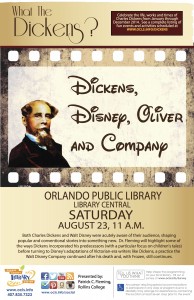Dickens, Disney, Oliver, and Company
This weekend I’ll be delivering my first public lecture, at the Orlando Public Library. I’m participating in their “What the Dickens” event, a year-long celebration of Charles Dickens. The timing is apt: I just returned from Dickens Universe, a yearly event in Santa Cruz for both scholars and the public. And right before that I was taking part in a National Endowment for the Humanities seminar, also about Dickens.
 Both of those experiences fed directly into this weekend’s talk, which really had its origins in a class I taught last spring, “Disney’s Victorians,” and a resulting conference paper delivered at the Children’s Literature Association conference.
Both of those experiences fed directly into this weekend’s talk, which really had its origins in a class I taught last spring, “Disney’s Victorians,” and a resulting conference paper delivered at the Children’s Literature Association conference.
While I was in California, I took a brief trip down to the Disney Archives. I spent a very productive two days there, looking at research reports from the 1940s, about Alice in Wonderland and Peter Pan, and at early drafts of Oliver & Company, Disney’s version of Oliver Twist. The latter is what my talk will focus on.
Oliver & Company had its origins in a 1985 story meeting — the same meeting at which animators pitched ideas for The Little Mermaid and “Treasure Island in space” (to become Treasure Planet a decade and a half later). Both those ideas were rejected, initially, and they decided to make “Oliver Twist with dogs.”
I’ll lead up to “Oliver Twist with dogs,” but will start in the late 1830s, with Dickens’s first work of fiction, The Pickwick Papers, and his first planned novel Oliver Twist. After focusing on the origins of these works, in the illustrations and the Poor Laws, I’ll turn to early stage adaptations. Victorian copyright didn’t extend across media, so Dickens had no control over (and made no money from) the theatrical versions of Pickwick or Oliver — both were on stage before they were even finished (they were published serially, so playwrights had about 2/3 of the text to draw on; they had to guess the end.) And, because of a century-old censorship act, plays staged anywhere other than state-licensed theaters (of which there were only two) had to include some element besides dramatic speech — usually music and dancing, hence the genre of the melodrama.
My goal, in describing this history, is to contextualize “Oliver Twist with dogs.” I’ll focus especially on the murder of Nancy, which is a major event in the book and becomes even more central to the stage adaptations. But surely Disney wouldn’t include such a scene of sexual violence — or would they? If you’re in Orlando, come to the talk and find out! (If not, I’m hoping to post a recording here).